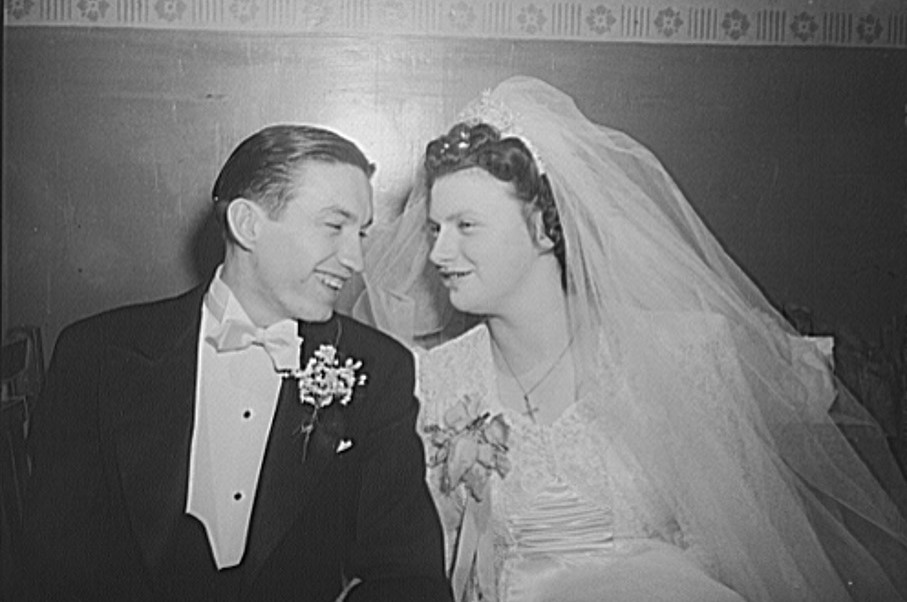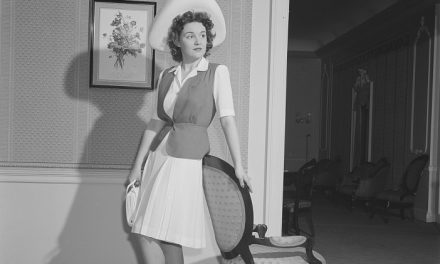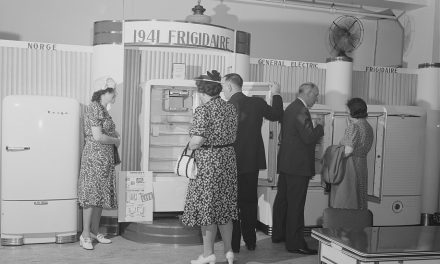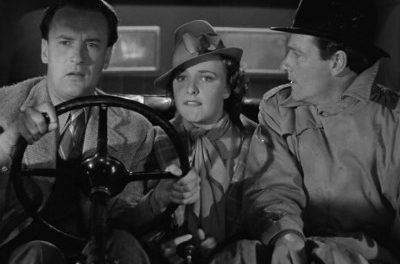While war can halt many things, it can never stop love. Young couples continue to fall in love and marry, despite the war and the complications that it can put on a wedding. These days, weddings that seem “irregular” are actually the norm—and they can be just as meaningful as a lavish affair for 200 guests. When planning a wartime wedding, here are some things to keep in mind: location, budget, wardrobe, catering, and gifts.
These days, weddings can be planned very quickly, as grooms in the military must be prepared to leave on ten days’ notice if they get called into duty. It is not unusual to receive an invitation that has been pre-printed with a handwritten date. Because of these quick preparations, many weddings are happening in hometowns when the groom travels home to marry his bride-to-be, or in chapels on military bases when the bride travels to see her groom. Just this week, the West Point Chapel saw 33 weddings in one day! When the groom comes home, a wedding ceremony is often held at the end of a regular Sunday morning mass, in front of both loved ones and strangers. When the bride travels to her groom, her family should pay for her travel and other expenses, and accompany her if possible. Brides should remember that grooms who are in the armed services will not be able to embark on an official honeymoon due to their call to duty.
How much should a wartime wedding cost? While some brides might be willing to spend a small fortune on an elaborate wedding, they risk having little or nothing left over for the essentials of a new home. Couples should spend whatever they feel comfortable spending on their wedding, but remember, what matters are the memories of the day. After all, you can’t repurpose your wedding dress into curtains or sheets.
Wedding guests come from different walks of life–some military and some civilians—so couples should remember that the wardrobe will differ. Those in the service should be asked to wear their dress blues, and civilians, to match, should wear dark colors. Civilian men should wear dark blue suits with blue ties and small boutonnieres. If groomsmen or ushers are in the Navy and wear white uniforms, civilians should be asked to wear white as well. With a mixed wedding, the guests will not match, and that is all right. Couples who want to do the traditional “saber arch” should remember that those holding the sabers must be commissioned officers—and must own swords!
Food is one of the things that can make everybody at a wedding happy. Different types of weddings will have different types of food, so a bride shouldn’t feel pressure to serve the same menu as the wedding she attended last month. For those with a larger guest list (and a budget to match), caterers will provide a variety of options. Even with a last-minute wedding, most good caterers can make arrangements with only 24 hours’ notice.
Many catering companies have been serving weddings for decades and will bring not only the food and cocktails, but will also supply all the necessary chairs, tables, china, silverware, linen and waiters. The caterers will suggest different menus; one menu suggested by a caterer contains:
Assorted canapés, cocktails, lobster and chicken salad, assorted sandwiches, ice cream, frosted cakes, coffee, wedding cake, champagne
Due to the sugar shortage, wedding cakes nowadays feature simple frosting. Couples have also been serving fruits with a brandy syrup and bread pudding as dessert.
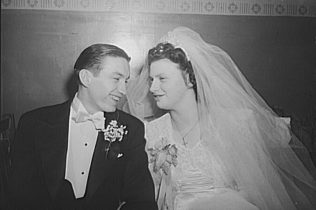
This newlywed couple, Cedelia Wrazen and Bronislaus Nowak, said they had a modest wedding due to food rationing. Both work at a company in Buffalo, New York, making condensers for the Navy. Photo by Marjory Collins, from Library of Congress.
What kind of gifts are appropriate? Many brides, unable to be with their new husbands due to military orders, are moving back home with their parents to work, and therefore have no need or space for large dinner sets. Instead, one should opt for smaller gifts, such as silverware sets or a nice table tray, either for serving or home décor. Many brides would also appreciate a luxurious linens—a set of new sheets, pillowcases, or napkins, for instance. Other fabrics, such as chintz, are wonderful gifts because they can be made into things such as covers and drapes.
Wedding coordinators, or party planners who specialize in weddings, have been a quickly-growing commodity in the wedding business. This planner can take the majority of the stress off the bride’s and her family’s shoulders, and help design a smoothly operated wedding. One New York City coordinator revealed her secrets to wedding-planning success.
“I like to have a face-to-face talk with every client,” she said. “In this way, I get an idea of what each one is like, what her tastes are, and so forth. Then I can create a wedding that precisely fits the bride’s personality—a party in which all the details harmonize and hang together.”
Wedding planners play three roles: social secretary, caterer, and hostess. The planner can arrange menus, organize the guest list, and schedule details, along with many other duties. Planners are a good option for brides who have plenty of time, as they are able to work out details and specifics on the special day.
All these details aside, what really matters are the memories that the bride and groom form on their special day. Many weddings are happening with only the bride, groom, a few witnesses, and the officiant. Wartime weddings often call for a different set of standards, but the most important part is that the happy couple enjoy their day and themselves.
Sources:
“33 Weddings Mark Day at West Point.” New York Times, January 20, 1943, p 14.
Bartlette, Helen. “Bride-Elect Is Wise to Budget Wedding Costs.” Chicago Daily Tribune, November 8, 1942, p G18.
Boykin, Elizabeth MacRae. “Wartime Wedding Gifts.” The Washington Post, May 20, 1943, p B7.
Holt, Jane. “For a Wartime Wedding.” The New York Times Magazine, April 12, 1942, p 22.
Holt, Jane. “Specialists in Planning Wedding Parties Can Do Much to Make Every One Happy.” New York Times, June 2, 1942, p 20.
Post, Emily. “‘FURLOUGH WEDDINGS’: War brings hurried marriages. They can be nice ones, too.” Los Angeles Times, June 28, 1942, p H19.

